So you’re looking for a printable list of high fiber foods, but you’re also hoping they are low-FODMAP. I have them!
If you want my top 15 low-FODMAP high-fiber foods, then keep reading.
Health Benefits of Fiber
In general, fiber is all parts of a plant-based food that cannot be digested or absorbed by the body. It is a complex carbohydrate (a type of carbohydrate that does not raise blood sugar levels).
And it’s an essential nutrient that we must get from our diet; the body does not make fiber on its own.
According to Mayo Clinic, here are 6 health benefits of fiber:
- Normalizes bowel movements
- Helps maintain bowel health
- Helps achieve lower cholesterol levels
- Can control blood sugar levels
- Aids in achieving healthy weight
- Helps you live longer
Healthy people consume a high-fiber diet, plant foods, and are at less risk for all types of medical conditions, including Colon Cancer.
You Need Fiber
First, yes you need fiber intake for overall health. And I know this scares many of you because all those gut health “gurus” are telling you “No, don’t do it. It’s not a good idea if you want to remain symptom-free.”
First, symptom-free and actually well are not the same things.
Read that again.
Second, here is what Dr. B says in his book, “Fiber Fueled,”
I suspect that many of you are thinking right now, How am I going to do this? I feel horrible when I eat those foods. What if my body hates fiber?
Statistically that’s 15 to 20 percent of people, but since you’re reading this book, there’s a decent chance you have irritable bowel.
Fifty to 80 percent of people with IBS have food sensitivities. But you are the person who needs this book the most.
That’s the great irony. The people who need fiber the most are the ones who will also struggle the most to eat it. You have to fix the gut to reap the reward of better health. And to fix the gut, we know we need fiber and diversity of plants.
But not all fiber is might be right for you right now.
And note that I did not say, “no fiber might be right for you right now.”
Big difference…..because the type of fiber matters.
Soluble vs. Insoluble Fiber
The two different types of fiber are: soluble + insoluble.
Soluble fiber (transforms into a thick, gel-like substance) dissolves in water, and is digested by bacteria in the large intestine.
This is the fiber that adds bulk to the stool; it’s a great way for addressing chronic constipation.
Insoluble fiber does not dissolve in water, and it is not digested (but will still help you achieve the daily fiber goal).
To see a list of soluble vs insoluble fiber sources click HERE.
You might tolerate one or the other better, depending on your current circumstances.
But here is something that can make it even more complicated: both soluble and insoluble fibers contain some foods that are high-FODMAP.
High-FODMAP Soluble Fiber Examples
- Brussels sprouts, just 3 sprouts contain a moderate amount of Fructans
- Apricots, just 3/4 apricot contains a moderate amount of Sorbitol
- Barley flakes, just 1/2 cup uncooked contains a high amount of Fructans
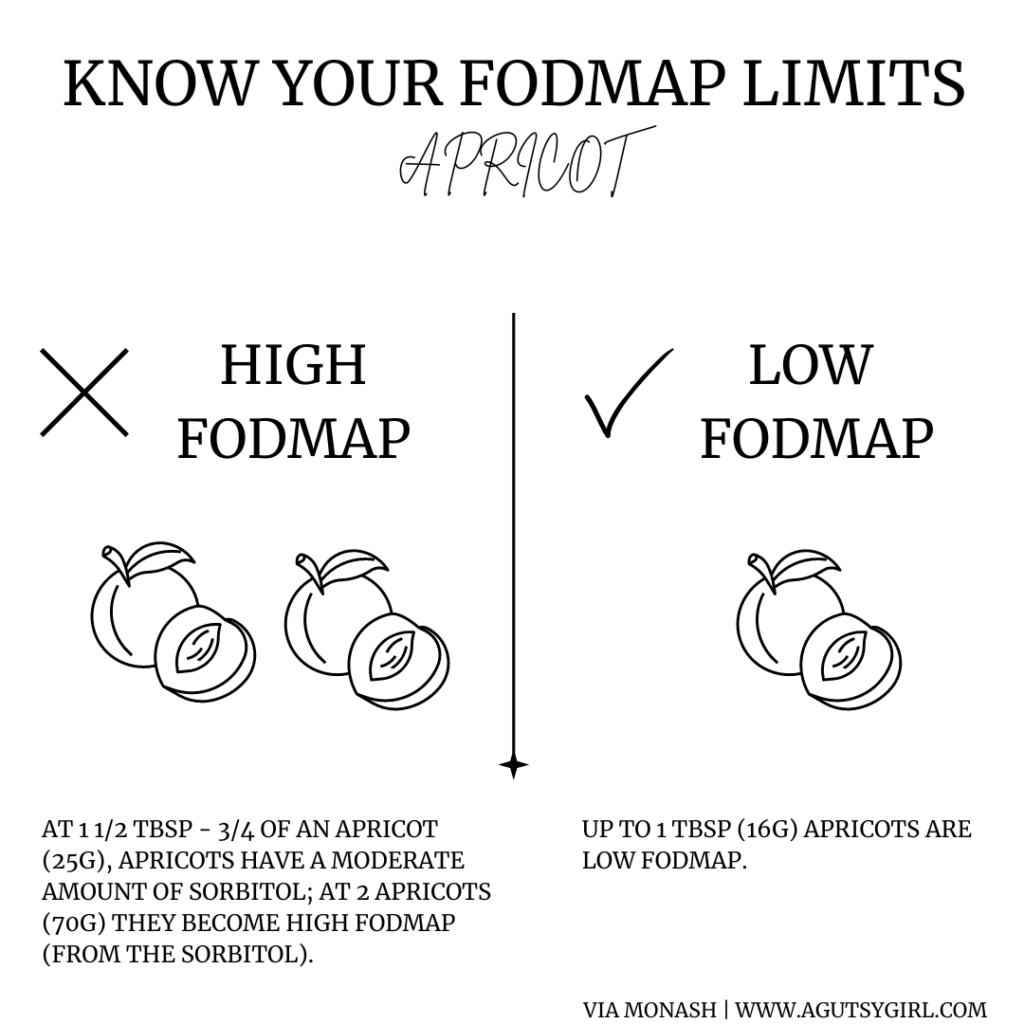
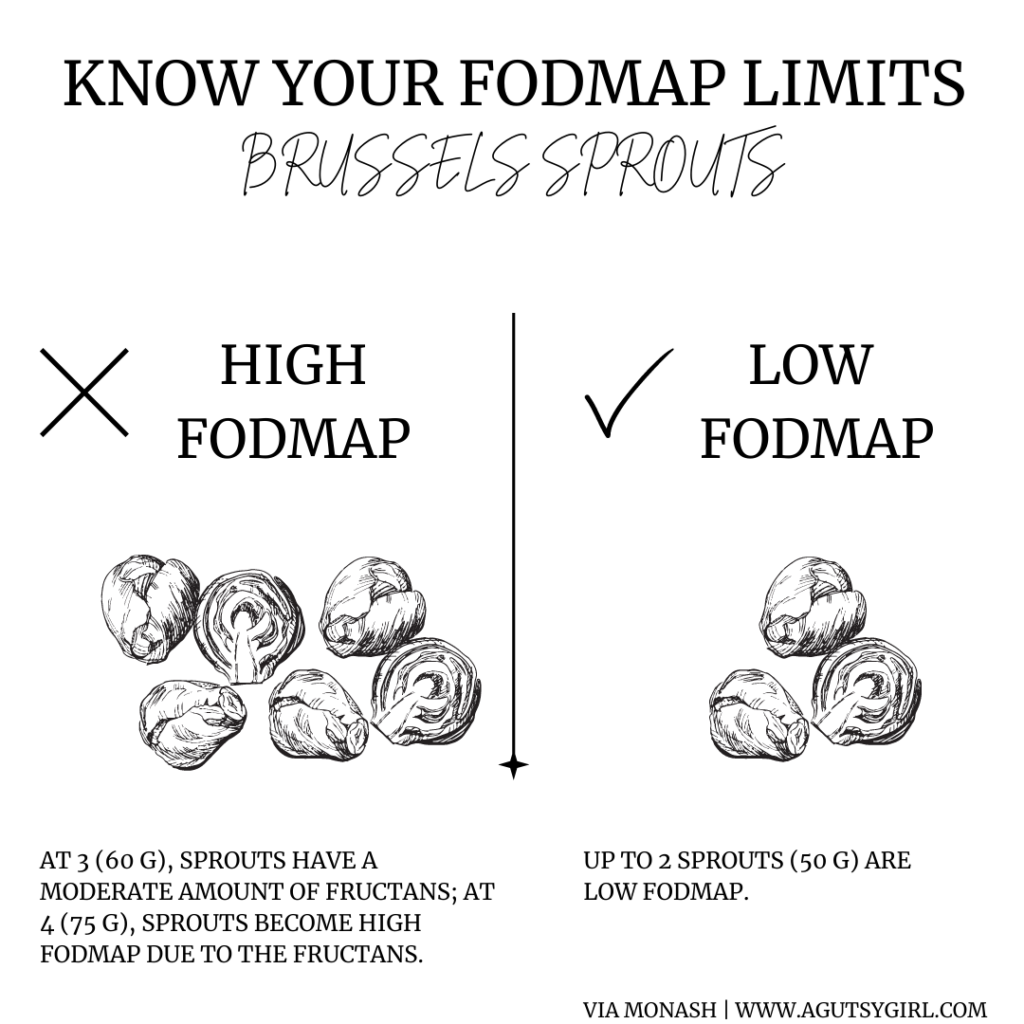
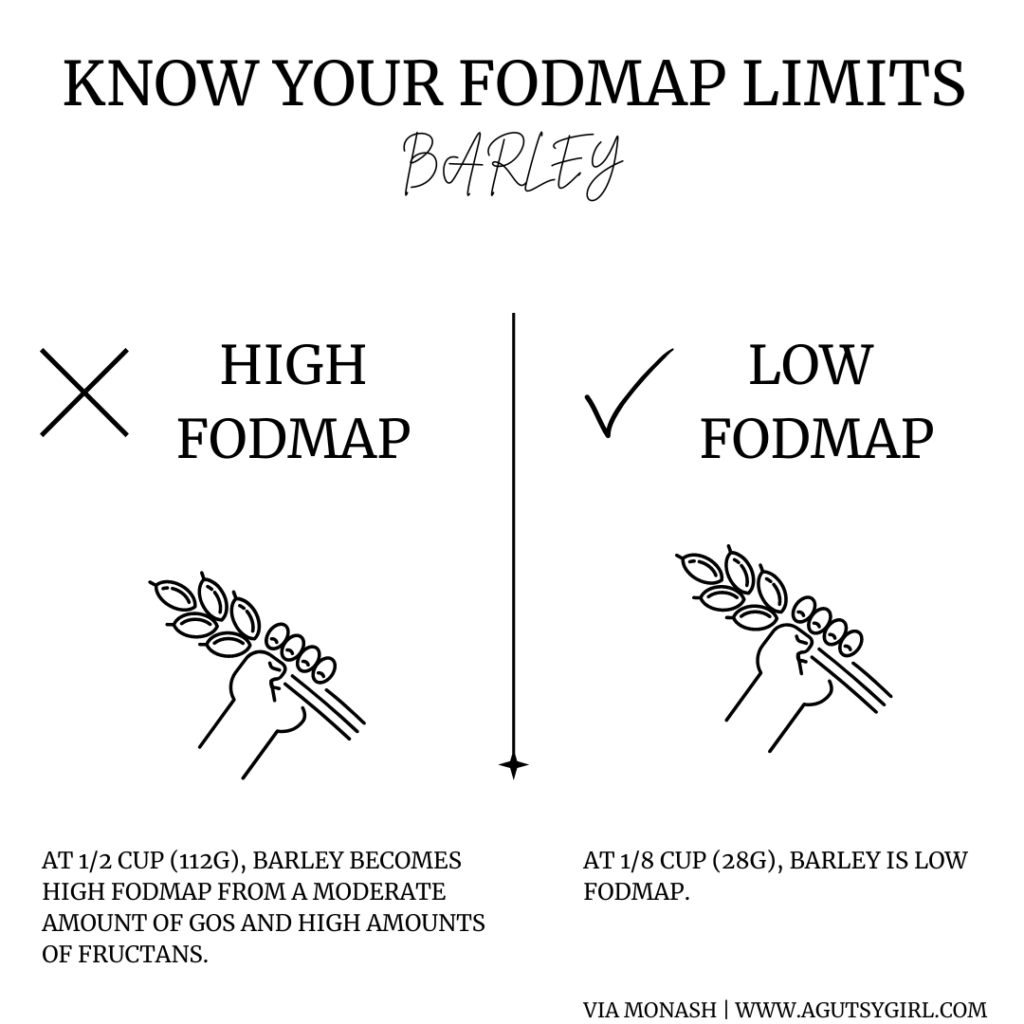
High-FODMAP Insoluble Fiber Examples
- Cauliflower, just 3/4 cup of cauliflower contains a high amount of Mannitol
- Blackberries, 1 medium blackberry contains a moderate amount of Sorbitol (2/3 cup contains a high amount of Sorbitol)
- Celery, 1/3 medium stalk contains a moderate amount of Mannitol
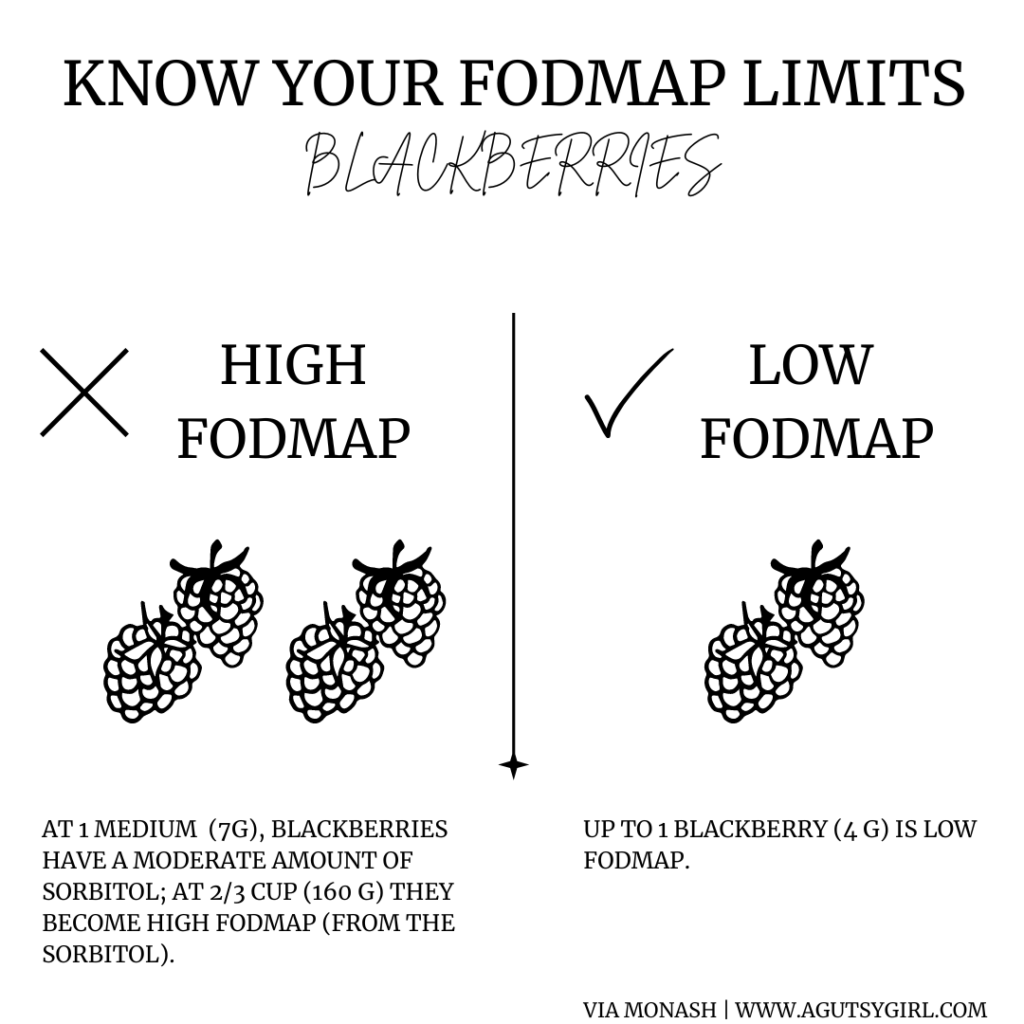
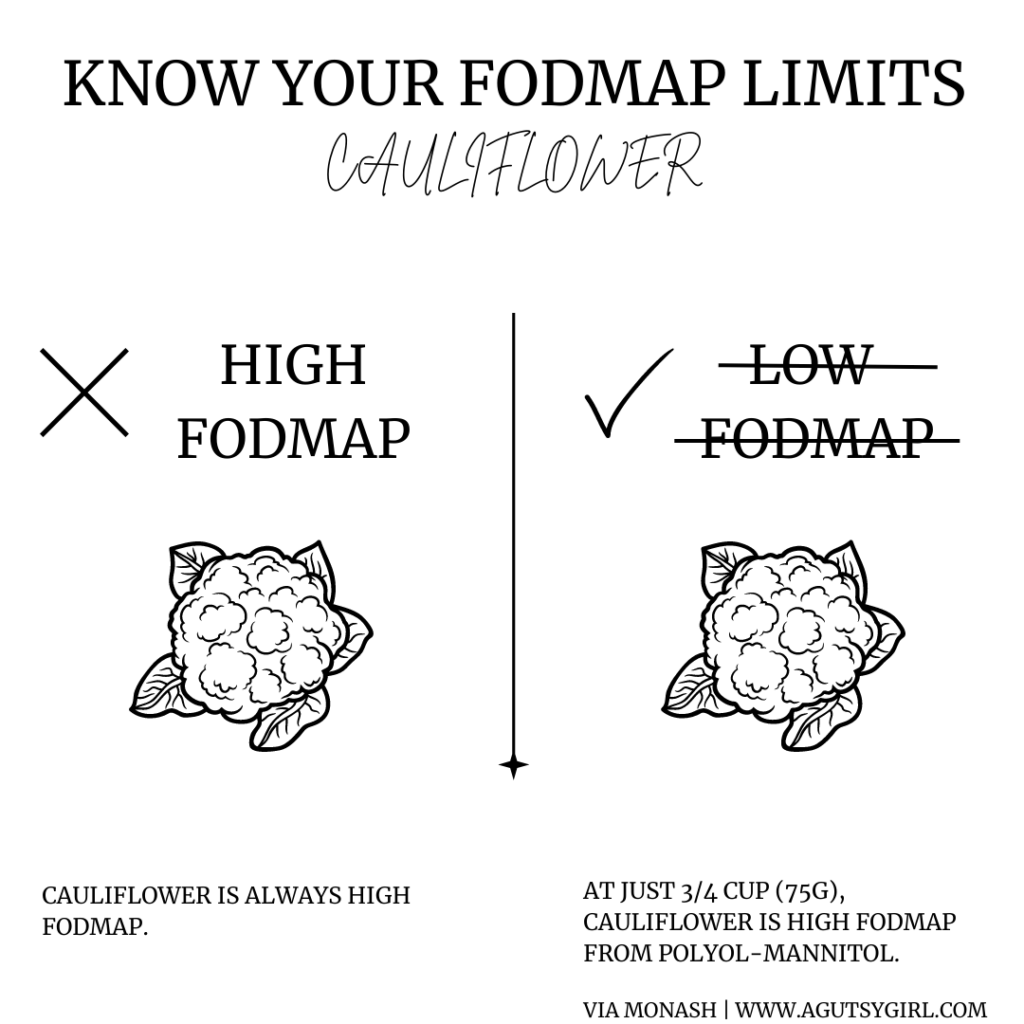
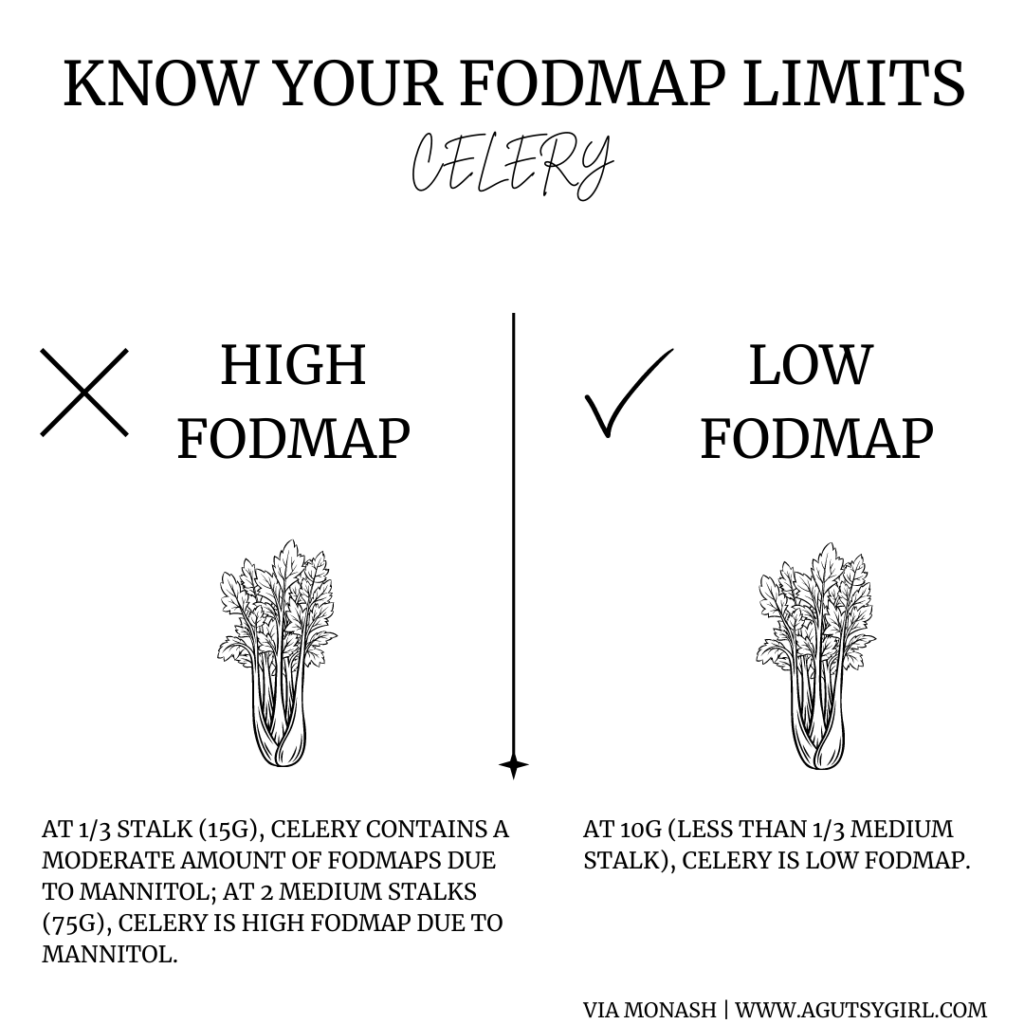
Now you’re more confused than ever, right?
Don’t be.
I’m going to help you break this all down even more.
Why You (Might) Need Low-FODMAP
To dismiss the idea that you might need to follow a low-FODMAP diet for a period of time would be doing you a disservice.
The low-FODMAP diet is not meant to be a lifelong lifestyle diet.
But for a period of time, if you have major IBS (irritable bowel syndrome) symptoms and/or have been diagnosed with a bacterial overgrowth, following the low-FODMAP diet is likely to help manage symptoms.
It’s been suggested that you might even be able to “starve the gut bacteria” by avoiding certain “bacteria-feeding” (aka FODMAP) foods.
And guess what?
I believe you can still eat fiber and heal your overgrowth. I’m not saying it will be 100% pleasant all the time, but there is a way to do it.
Ready for the secret?
Low-FODMAP but still high-fiber foods…..say whaaaaaat?!
And I have some of my favorites to share with you.
In fact, my top 15 low-FODMAP high-fiber foods list is delicious!
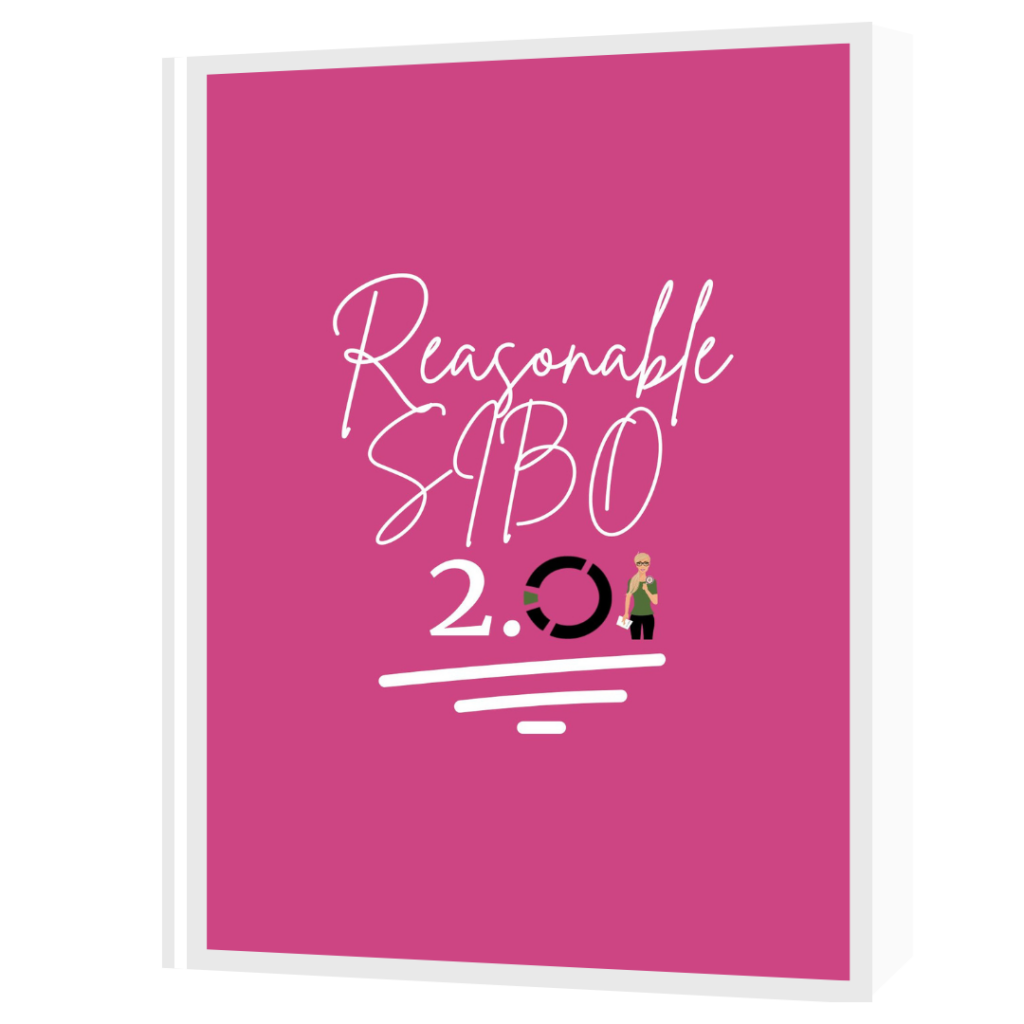
The FODMAP graphics below are taken from Reasonable SIBO.
You’ll find 310 graphics like this in the e-book.
Printable List of High Fiber Foods (Top 15 Low-FODMAP High-Fiber Foods)
Click HERE to save this printable list of high fiber-rich foods that are also low FODMAP for later.
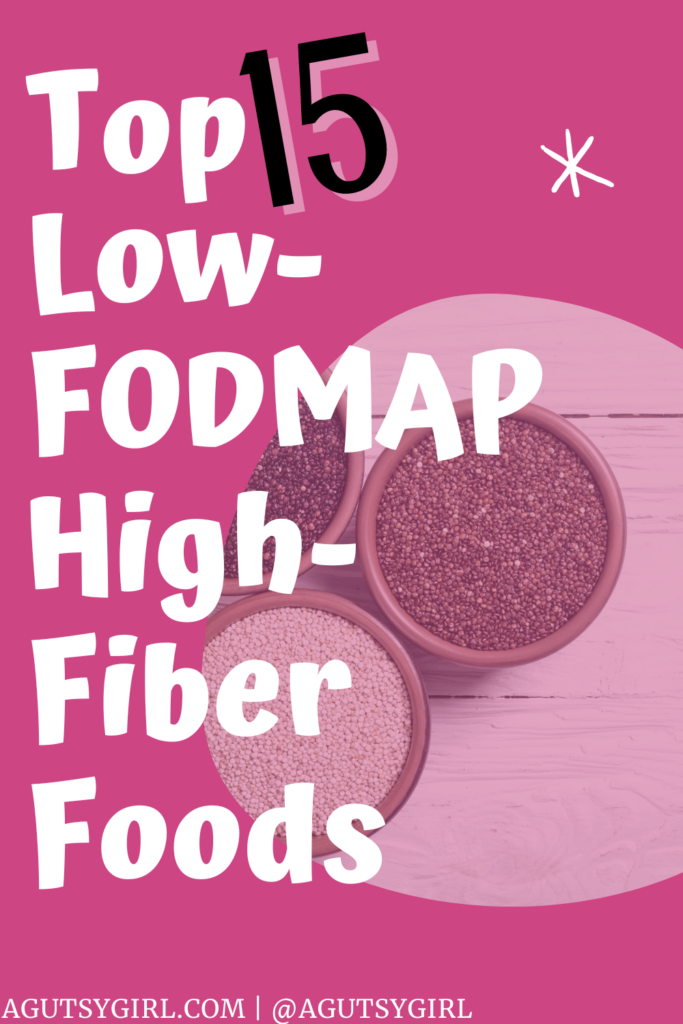
Notes: Next to each food item, I have also listed other templated diets the food fits under, in case you’re following any of them.
Beneath that, I give the amount of fiber per serving and FODMAP status.
And BTW – of course I realize this is not a comprehensive templated diet list. These are just the ones the community seems to come back to time-and-time again.
Save this list for later by clicking HERE.
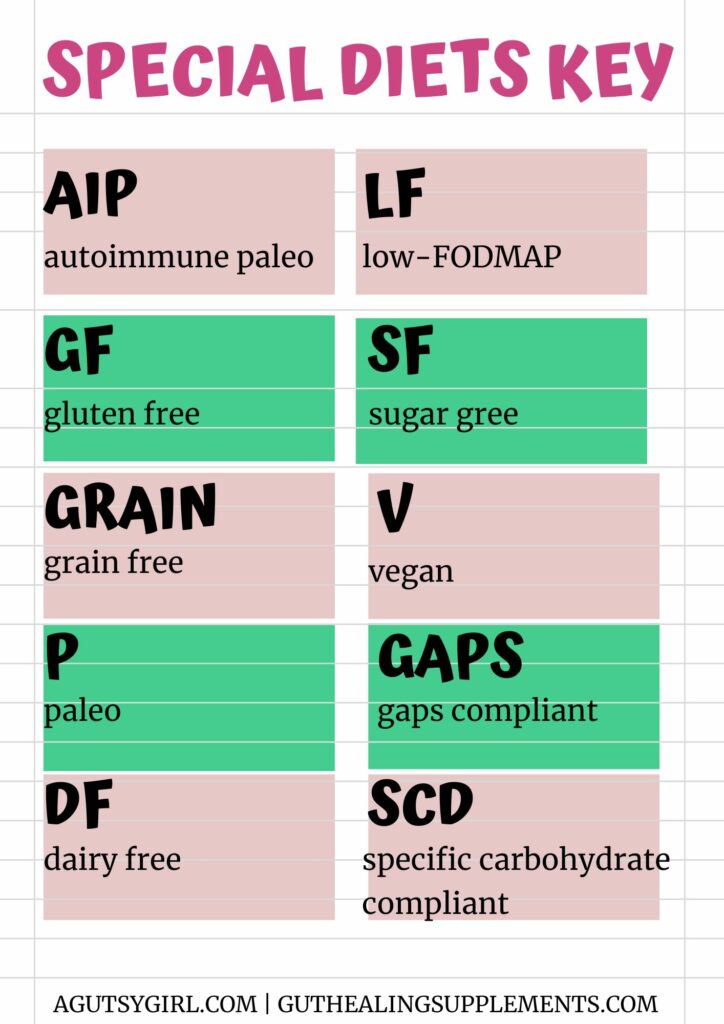
Special Diets Key
- AIP = Autoimmune Paleo
- GF = gluten free
- Grain = grain free
- P = Paleo
- DF = dairy free
- LF = low-FODMAP
- SF = sugar free
- V = Vegan
- GAPS = GAPS compliant
- SCD = Specific Carbohydrate compliant
Printable List of High-Fiber Foods
- Quinoa: GF, DF, LF, SF, and V. Makes a great base for any low-FODMAP Buddha Bowl.
- 5 grams of fiber per 1 cup cooked serving
- 1 cup cooked quinoa is low-FODMAP
- Kiwi: AIP, GF, Grain, P, DF, LF, V, GAPS, SCD. Kiwi is a “secret” digestive system powerhouse. Small in size, but nutrient dense and great for bowel movements.
- 2.1 grams of fiber per 1 kiwifruit
- up to 2 small kiwifruits are low-FODMAP
- Green Beans: AIP, GF, Grain, P, DF, LF, SF, V, GAPS, SCD. I love soaking (aka sautéing) green beans in olive or coconut oil, then topping with some salt.
- 3.4 grams of fiber in a 1 cup serving
- up to 15 green beans are low-FODMAP (that’s about a cup)
- Chia Seeds: GF, Grain, P (?), DF, LF, SF, V. Fairly certain I could enjoy some version of my 2-ingredient chia seed pudding daily.
- 10 grams of fiber in one serving, 2 Tablespoons
- chia seeds are always low-FODMAP
- Chickpeas, canned: GF, Grain, DF, LF, SF, V. You might be wondering why I say “canned.” It’s intentional. Canned legumes/pulses have lower FODMAP content because the water soluble Oligos-GOS and Fructans leach out of the bean.
- About 8 grams of fiber in 1/4 cup of chickpeas (35 grams in 1 cup)
- up to 1/4 cup (42g) canned chickpeas are low-FODMAP
- Brown Rice: GF, DF, LF, SF, V. Now, I actually love white rice. However, brown rice is where the fiber is at.
- There are about 3.5 grams of fiber in one cup cooked brown rice
- Brown rice is always low-FODMAP
- Flax Seeds: GF, Grain, P (?), DF, LF, SF, V. The other reason I love using flax seeds? Seed cycling!
- 1 Tablespoon flax seed has 2.8 grams of fiber
- up to 1 Tablespoon flax seed is low FODMAP
- Polenta: GF, DF, LF, V. Also known as “grits” or “cornmeal.” This is an item that’s not often considered for your high-fiber, low-FODMAP journey. But it should be. Honestly, the first time I ever had it was while we were in Italy. Since then, I continue getting creative with it.
- 1 cup cooked polenta has 6 grams of fiber
- Polenta is always low FODMAP
- Lentils, canned: GF, Grain, DF, LF, SF, V, GAPS (full), SCD. If you’re wondering on the “canned” part, see above on chickpeas.
- There are different types of lentils, so depending on which brand, variety, etc. your lentils will have anywhere from 3-5 grams of fiber per 1/2 cup
- Canned lentils are always low-FODMAP
- Kale: AIP, GF, Grain, P, DF, LF, SF, V, GAPS, SCD. Kale sometimes gets a bad name in the gut health and healing space. If you want to learn more, check out Kale and Your Gut HERE.
- 1 cup chopped kale has approximately 2.6 grams of fiber
- Kale is always low-FODMAP
- Carrots: AIP, GF, Grain, P, DF, LF, V, GAPS. There is a recipe for my Maple-Balsamic Vinegar-Roasted Carrots in The Leaky Gut Meal Plan. This can be found in the vegetables and sides section.
- 1/2 cup of chopped carrots have about 2 grams of fiber
- Carrots are always low-FODMAP
- Oats: GF, DF, LF, SF, V. In case you’ve never had my 32g of fiber Oatmeal Bowl!
- 1/2 cup of raw oats has roughly 4 grams of fiber
- rolled oats are always low-FODMAP
- Oranges: AIP, GF, Grain, P, DF, LF, V, GAPS, SCD. Because I love citrus fruits, I once made a Frothy Freshly Squeezed Orange Juice, and it needs to be made again.
- 1 small orange has 2.3 grams of fiber
- oranges are always low-FODMAP
- Raspberries: AIP, GF, Grain, P, DF, LF, V, GAPS. Raspberries are a great example of a food item that some with SIBO avoid altogether because at 1 cup they are high-FODMAP. If you enjoy just 1/2 cup, you’ll be in the low-FODMAP range and able to get a fairly good amount of fiber.
- 30 raspberries contain almost 4 grams of fiber (1 cup of raspberries has 8 grams of fiber)
- 30 raspberries are low-FODMAP (at 35 they become moderate due to the Fructans)
- Pumpkin Seeds: GF, Grain, P, DF, LF, SF, V, GAPS and SCD (?). One of my latest addictions are roasted, salted pumpkin seeds. I get 5 grams of fiber in no time! Bonus: my kids all love them, too.
- 1 ounce of pumpkin seeds (about 85) contains 5 grams of fiber
- Pumpkin seeds are always low-FODMAP
You can click HERE to save your free printable list of high fiber foods that are also low-FODMAP.
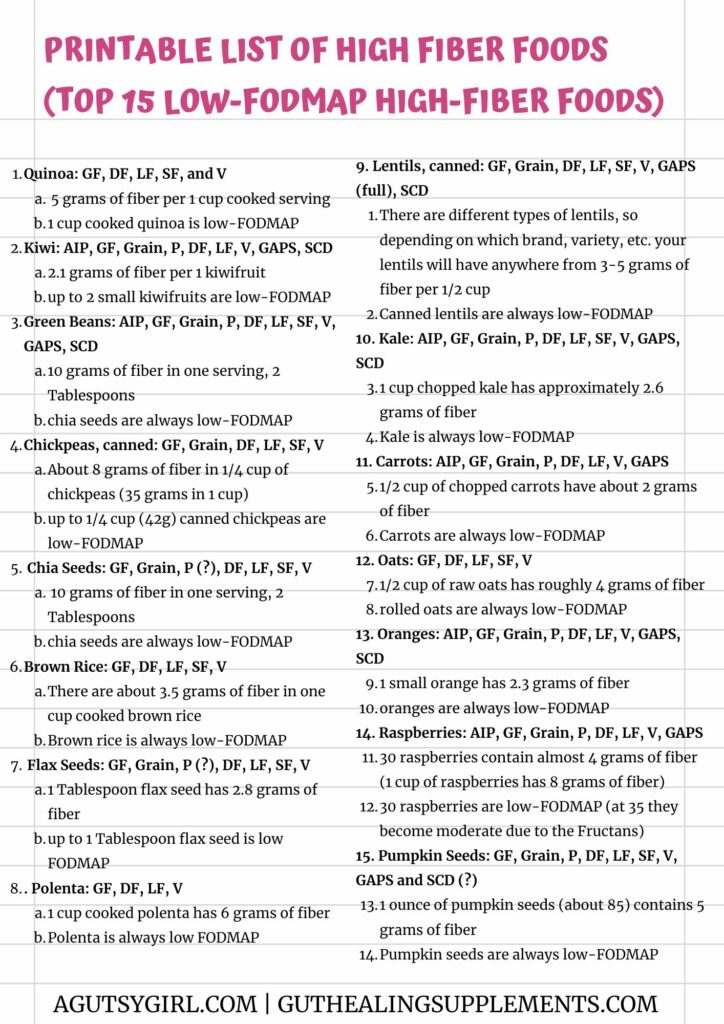
One Day of Eating Low-FODMAP High-Fiber
Now you’re wondering, “Okay, so there are 15 foods, but what should I do with them on any given day if I’m following a low-FODMAP diet?”
Here you go, a little “menu” of sorts filled with great sources of fiber.
Breakfast: Low-FODMAP, High-Fiber
- Egg scramble
- 2 eggs
- 1 cup chopped kale (2.6 grams of fiber)
- 1/2 cup of green beans (about 1.6 grams of fiber)
- 1/4 cup chopped scallion (remember, green part only is low-FODMAP)
- sautéed in coconut or olive oil
- 2 small kiwifruits (about 4 grams of fiber) (a good option for both hitting your fiber goals PLUS helping with regular bowel movements)
Total fiber: about 8 grams
Lunch: Low-FODMAP, High-Fiber
Creamy Cilantro Brown Rice Bowl {Vegan}
- 1 cup cooked brown rice (3.5 grams of fiber)
- 2/3 cup cubed tofu
- 1/2 cup canned lentils, strained (about 3 grams of fiber)
- 1/2 ounce pumpkin seeds (about 2.5 grams of fiber)
- pour the Creamy Cilantro Sauce over the bowl
Total fiber: about 9 grams
Dinner: Low-FODMAP, High-Fiber
Polenta Bowl with grilled chicken
- 1 cup cooked polenta (6 grams of fiber)
- 1/2 cup grilled chicken (or another meat of choice)
- 1 1/2 cups spinach (not on my list, but this amount of spinach is low-FODMAP and has about 1.5 grams of fiber)
After the polenta and grilled chicken have been prepared, add them and the spinach to a large pan and saute with garlic-infused olive oil and some salt + pepper.
Total fiber: about 7.5 grams
Snack: Low-FODMAP, High-Fiber
- Chia Seed Pudding with fresh raspberries on top
- Make my 2-ingredient chia seed pudding (there are 2 1/2 Tablespoons chia seed in it so around 12 grams of fiber)
- top with 30 raspberries (about 4 grams of fiber)
- Make my 2-ingredient chia seed pudding (there are 2 1/2 Tablespoons chia seed in it so around 12 grams of fiber)
Total fiber: about 16 grams
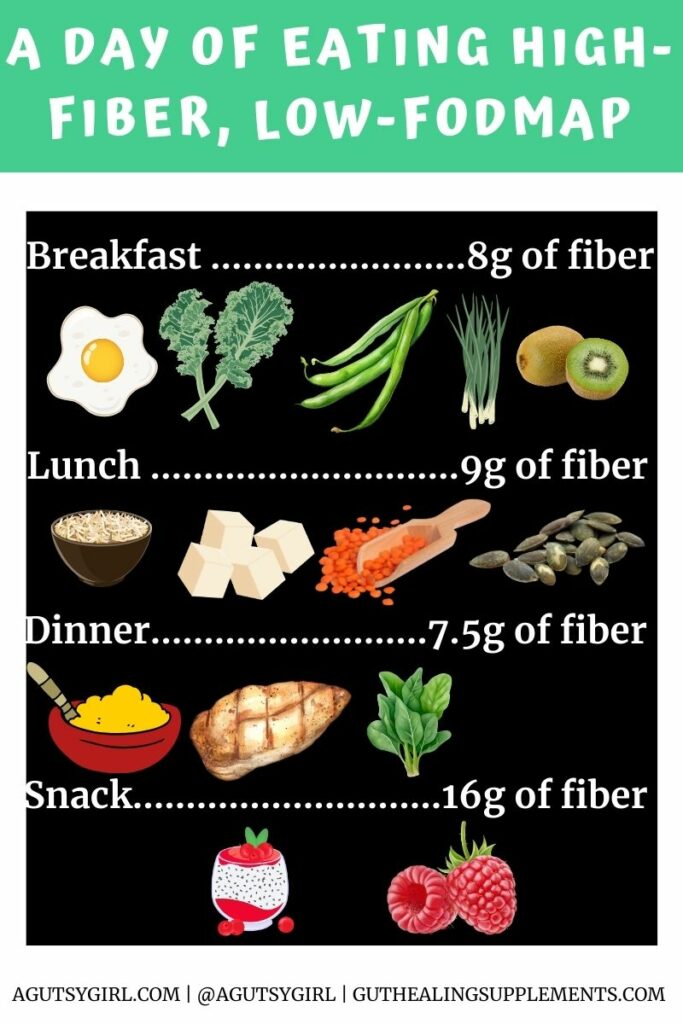
Did you see what just happened?
You ate low-FODMAP, in easy ways, for an entire day and still (without supplementing) got over 40 grams of dietary fiber!
And yes, that exceeds the recommended daily amount.
By the way, keeping track of all this is super simple with my gut healing journaling system I created just for you, darling.
Small changes will add up in a big way!
Still worried about not getting enough fiber?
If you’re doing everything you can from a dietary standpoint, but still not getting in the amount of fiber you’d like, consider supplementing.
Here are my recommendations:
- Perfect Plant Protein – Pumpkin Seed, Hemp Seed, Sacha Inchi: GF, DF, LF, Keto, P, and V. IMO, this is the best plant protein on the market that’s also low-FODMAP, high in fiber, Vegan, and Organic. Use code GUTSY10 at checkout to save 10%.
- 1 serving size contains 4g of fiber
- Guar Gum: It’s a fact that oftentimes while on SIBO antibiotics, doctors will recommend taking Guar Gum simultaneously. “The combination of rifaximin with partially hydrolysed guar gum seems to be more useful in eradicating SIBO compared with rifaximin alone.” (source)
- The NOW Foods Guar Gum is just 100% pure powder. In 1/2 teaspoon there is 1 gram of fiber.
- Thorne FiberMend Prebiotic: Thorne is an incredible supplement brand and company. Many with SIBO use this because it’s well-tolerated with less gas and bloating. I have linked to the product on Amazon, but you can get it cheaper with access to my Fullscript online dispensary HERE.
- One scoop provides 7 grams of fiber
So, what do you think of these top 15 low-FODMAP high-fiber foods? Any surprise you?
If you liked this printable list of high fiber foods article, you might also enjoy:
- Where is Quinoa in the Grocery Store (and How to Shop for Gut Health)
- Weight Loss Through Optimal Gut Health
- Constipation Printable List of High Fiber Foods
Xox,
SKH
🤰 bloating be gone! weight loss through optimal gut health for women
💃ʜᴇᴀʟ ʏᴏᴜʀ ɢᴜᴛ. ʜᴇᴀʟ ʏᴏᴜʀ ʟɪfe.
🫶🏻 founder gutbyome.com

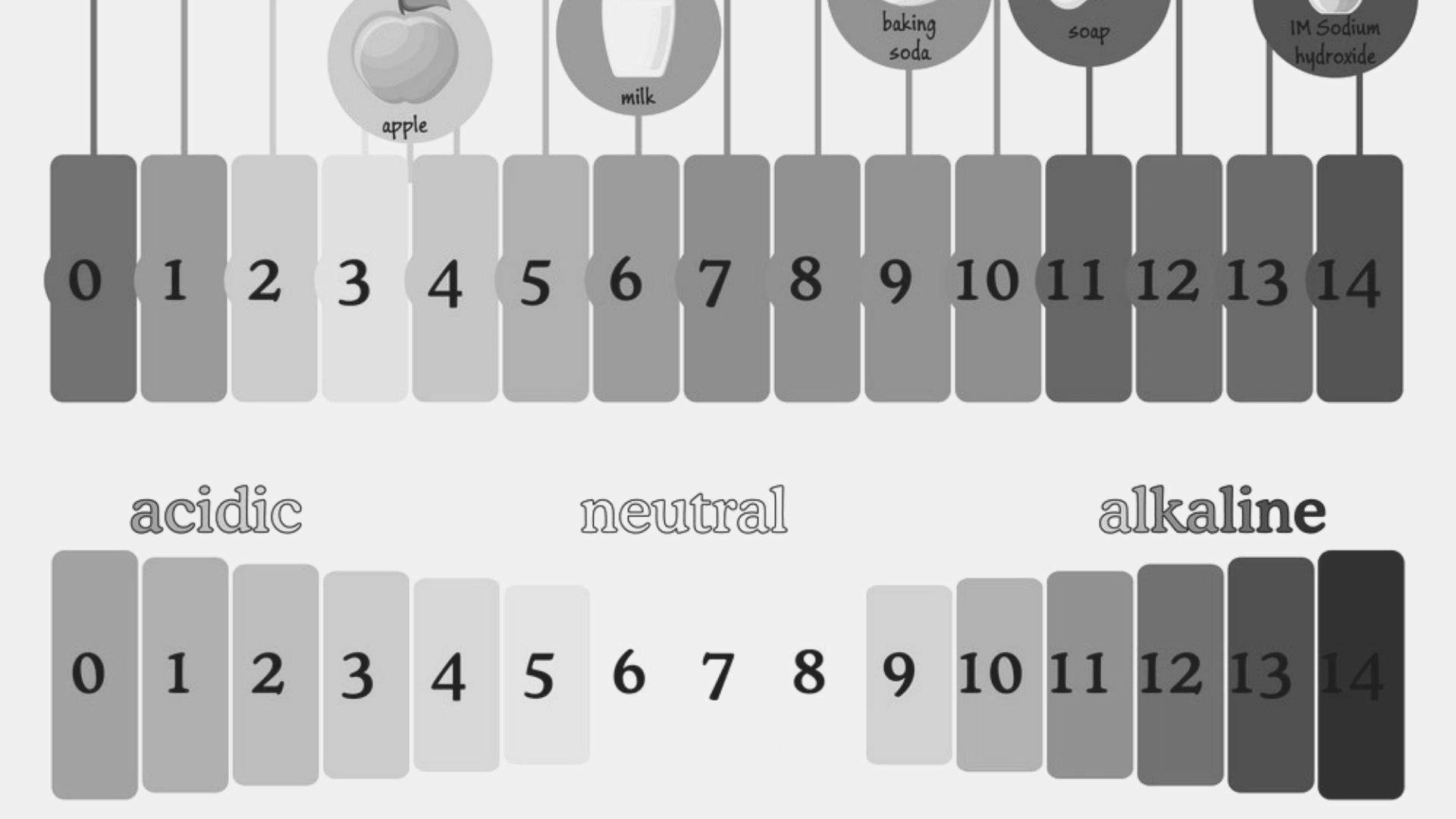
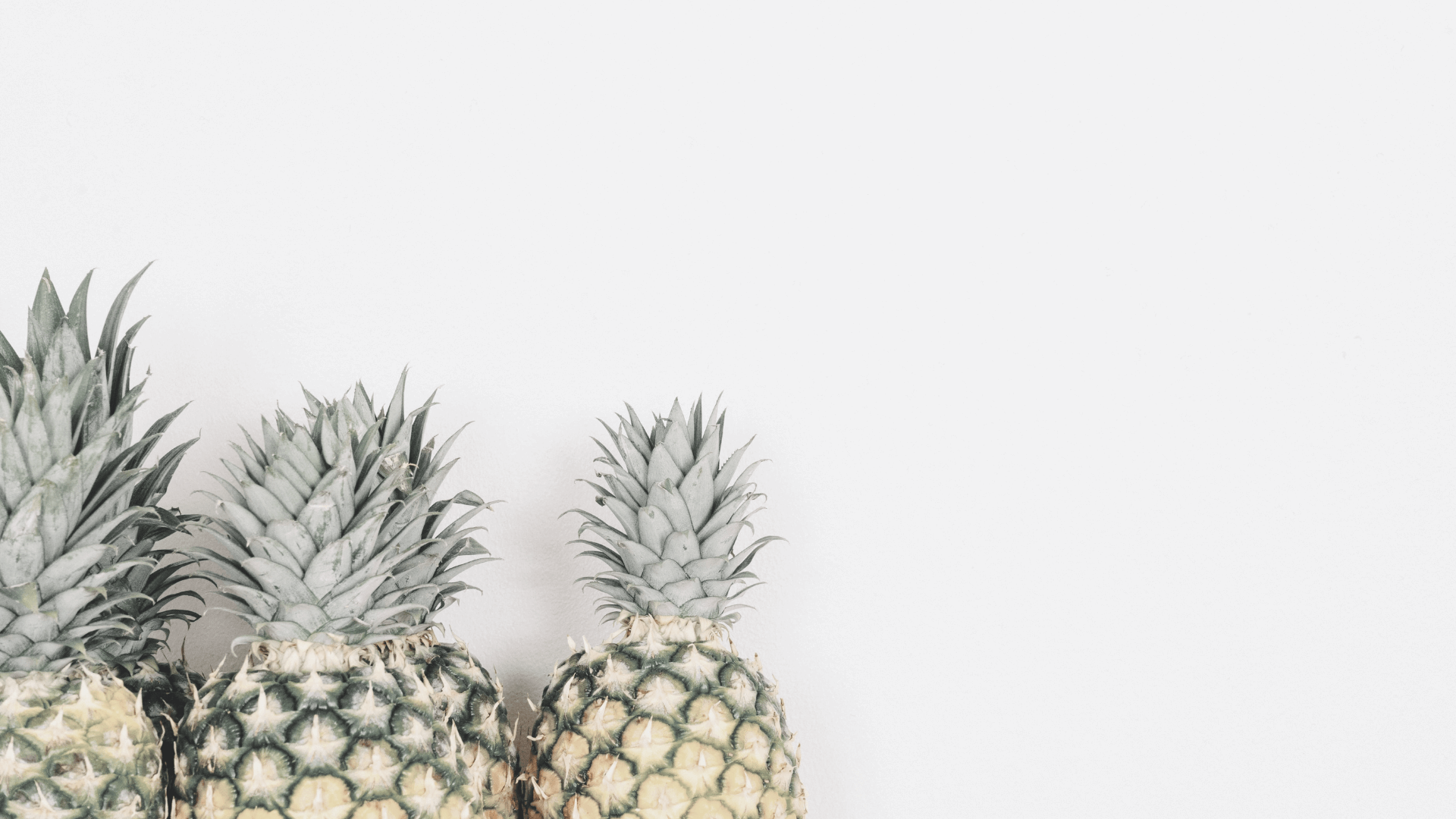

![Podcast Topics [Q&A 3 with A Gutsy Girl]](https://agutsygirl.com/wp-content/uploads/2021/10/episode-20-podcast-featured-agutsygirl.com_.png)
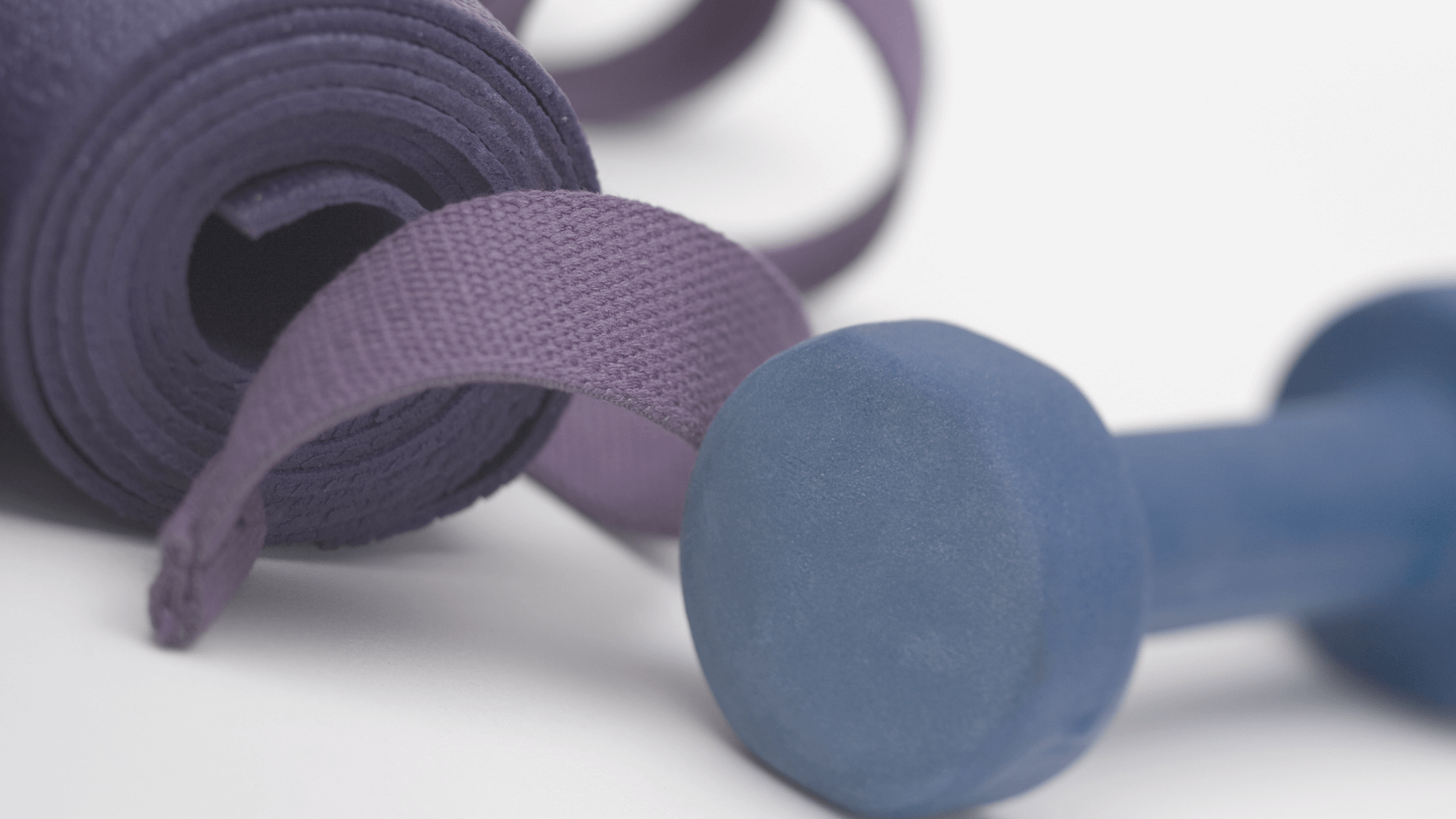
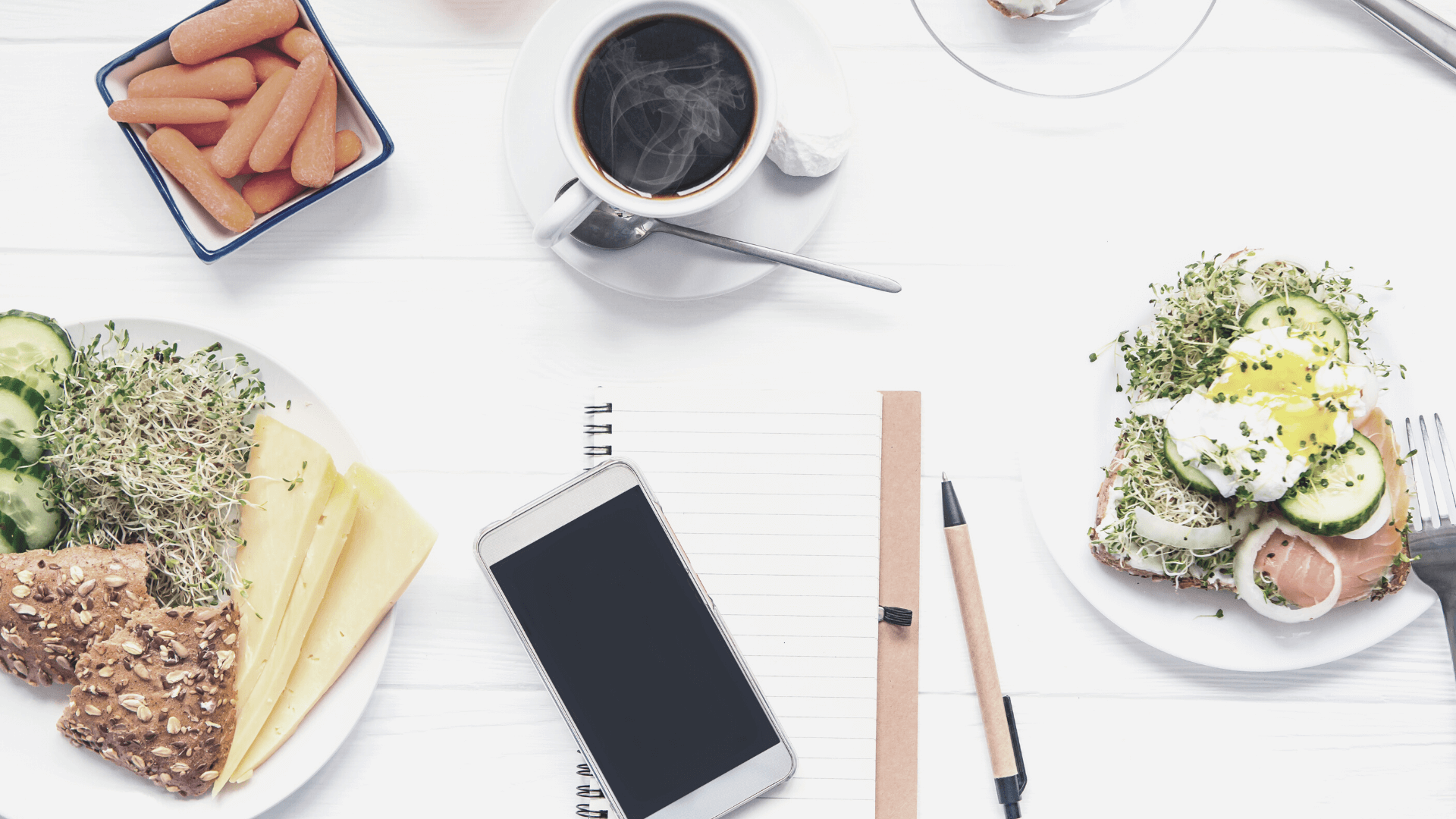
Why do we need fiber for sibo if we are low fodmap if we need to starve bacteria? How will it benefit sibo patients on a low fodmap diet?